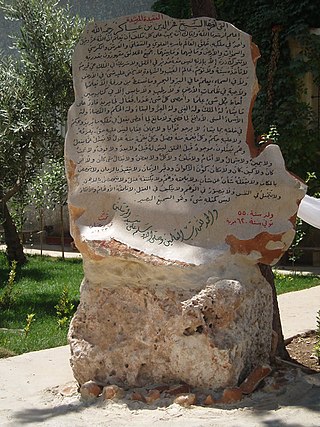Related Research Articles
A cosmological argument, in natural theology, is an argument which claims that the existence of God can be inferred from facts concerning causation, explanation, change, motion, contingency, dependency, or finitude with respect to the universe or some totality of objects. A cosmological argument can also sometimes be referred to as an argument from universal causation, an argument from first cause, the causal argument, or prime mover argument. Whichever term is employed, there are two basic variants of the argument, each with subtle yet important distinctions: in esse (essentiality), and in fieri (becoming).

Monism attributes oneness or singleness to a concept, e.g. existence. Various kinds of monism can be distinguished:
The teleological argument is an argument for the existence of God or, more generally, that complex functionality in the natural world which looks designed is evidence of an intelligent creator.
In Christian theology, traducianism is a doctrine about the origin of the soul holding that this immaterial aspect is transmitted through natural generation along with the body, the material aspect of human beings. That is, human propagation is of the whole being, both material and immaterial aspects: an individual's soul is derived from the soul of one or both parents. This implies that only the soul of Adam was created directly by God, in contrast with the idea of creationism of the soul, which holds that all souls are created directly by God.

Free will is the notional capacity or ability to choose between different possible courses of action unimpeded.
A creator deity or creator god is a deity responsible for the creation of the Earth, world, and universe in human religion and mythology. In monotheism, the single God is often also the creator. A number of monolatristic traditions separate a secondary creator from a primary transcendent being, identified as a primary creator.

In monotheistic theology, the doctrine of Divine Simplicity says that God is simple.
Occasionalism is a philosophical doctrine about causation which says that created substances cannot be efficient causes of events. Instead, all events are taken to be caused directly by God. The doctrine states that the illusion of efficient causation between mundane events arises out of God's causing of one event after another. However, there is no necessary connection between the two: it is not that the first event causes God to cause the second event: rather, God first causes one and then causes the other.
John Scotus Eriugena, also known as Johannes Scotus Erigena, John the Scot, or John the Irish-born was an Irish Neoplatonist philosopher, theologian and poet of the Early Middle Ages. Bertrand Russell dubbed him "the most astonishing person of the ninth century". The Stanford Encyclopedia of Philosophy states that he "is the most significant Irish intellectual of the early monastic period. He is generally recognized to be both the outstanding philosopher of the Carolingian era and of the whole period of Latin philosophy stretching from Boethius to Anselm".

The Catholic Church holds no official position on the theory of creation or evolution, leaving the specifics of either theistic evolution or literal creationism to the individual within certain parameters established by the Church. According to the Catechism of the Catholic Church, any believer may accept either literal or special creation within the period of an actual six-day, twenty-four-hour period, or they may accept the belief that the earth evolved over time under the guidance of God. Catholicism holds that God initiated and continued the process of his creation, that Adam and Eve were real people, and that all humans, whether specially created or evolved, have and have always had specially created souls for each individual.

Jewish views on evolution includes a continuum of views about the theory of evolution, experimental evolution, the origin of life, age of the universe, evolutionary creationism, and theistic evolution. Today, many Jewish people accept the theory of evolution and do not see it as incompatible with traditional Judaism, reflecting the emphasis of prominent rabbis such as the Vilna Gaon and Maimonides on the ethical rather than factual significance of scripture.

The Incoherence of the Philosophers was a landmark 11th-century work by the Muslim polymath al-Ghazali and a student of the Asharite school of Islamic theology criticizing the Avicennian school of early Islamic philosophy. Muslim philosophers such as Ibn Sina (Avicenna) and Al-Farabi (Alpharabius) are denounced in this book, as they follow Greek philosophy even when, in author's perception, it contradicts Islam. The text was dramatically successful, and marked a milestone in the ascendance of the Asharite school within Islamic philosophy and theological discourse.
God the Sustainer is the conception of God who sustains and upholds everything in existence.
The image of God is a concept and theological doctrine in Christianity, Islam, as well as in Judaism. This concept is a foundational aspect of Christian and Jewish understandings of human nature. It stems from the primary text in Genesis 1:27, which reads: "So God created man in his own image, in the image of God created he him; male and female he created them." The exact meaning of the phrase has been debated for millennia.
In religion, transcendence is the aspect of existence that is completely independent of the material universe, beyond all known physical laws. This is related to the nature and power of deities as well as other spiritual or supernatural beings and forces. This is contrasted with immanence, where a god is said to be fully present in the physical world and thus accessible to creatures in various ways. In religious experience, transcendence is a state of being that has overcome the limitations of physical existence, and by some definitions, has also become independent of it. This is typically manifested in prayer, rituals, meditation, psychedelics and paranormal "visions".
Theological determinism is a form of predeterminism which states that all events that happen are pre-ordained, and/or predestined to happen, by one or more divine beings, or that they are destined to occur given the divine beings' omniscience. Theological determinism exists in a number of religions, including Jainism, Judaism, Christianity, and Islam. It is also supported by proponents of Classical pantheism such as the Stoics and by philosophers such as Baruch Spinoza.
Conceptions of God in monotheist, pantheist, and panentheist religions – or of the supreme deity in henotheistic religions – can extend to various levels of abstraction:
Free will in theology is an important part of the debate on free will in general. Religions vary greatly in their response to the standard argument against free will and thus might appeal to any number of responses to the paradox of free will, the claim that omniscience and free will are incompatible.

Medieval philosophy is the philosophy that existed through the Middle Ages, the period roughly extending from the fall of the Western Roman Empire in the 5th century until after the Renaissance in the 13th and 14th centuries. Medieval philosophy, understood as a project of independent philosophical inquiry, began in Baghdad, in the middle of the 8th century, and in France, in the itinerant court of Charlemagne, in the last quarter of the 8th century. It is defined partly by the process of rediscovering the ancient culture developed in Greece and Rome during the Classical period, and partly by the need to address theological problems and to integrate sacred doctrine with secular learning.
Although biological evolution has been vocally opposed by some religious groups, many other groups accept the scientific position, sometimes with additions to allow for theological considerations. The positions of such groups are described by terms including "theistic evolution", "theistic evolutionism" or "evolutionary creation". Of all the religious groups included on the chart, Buddhists are the most accepting of evolution. Theistic evolutionists believe that there is a God, that God is the creator of the material universe and all life within, and that biological evolution is a natural process within that creation. Evolution, according to this view, is simply a tool that God employed to develop human life. According to the American Scientific Affiliation, a Christian organization of scientists:
A theory of theistic evolution (TE) — also called evolutionary creation — proposes that God's method of creation was to cleverly design a universe in which everything would naturally evolve. Usually the "evolution" in "theistic evolution" means Total Evolution — astronomical evolution and geological evolution plus chemical evolution and biological evolution — but it can refer only to biological evolution.
References
- ↑ “Causality Primary and Secondary”, Mariano Artigas, Encyclopedia of Science and Religion, ©2003 Gale Cengage; online at http://www.enotes.com/causality-primary-secondary-reference/causality-primary-secondary
- ↑ “Kant’s Theory of Divine and Secondary Causation”, Des Hogan, University of California at San Diego; online at http://philosophy.ucsd.edu/_files/facultysites/watkins-conference/hogan.pdf;
- ↑ “Causation as a Secondary Quality”, Peter Menzies and Huw Price, Br. J. Philos. Sci., 44 (1993), 187-203.
- ↑ Huff, Toby E. The Rise of Early Modern Science: Islam, China and the West, Cambridge University Press, (2003).
- ↑ St. Augustine, the Literal Meaning of Genesis. vol. 1, Ancient Christian Writers., vol. 41. Translated and annotated by John Hammond Taylor, S.J. New York: Paulist Press, 1982.
- ↑ The Origin of Science, by Stanley L. Jaki.
- ↑ “De vegetabilibus etplantis”, by Albertus Magnus(1193-1206)
- ↑ Compendium of Dialectic [Summulae de dialectica]. by Buridan (<1300-1361)
- ↑ Stanford Encyclopedia of Philosophy, John Buridan online at http://plato.stanford.edu/entries/buridan/